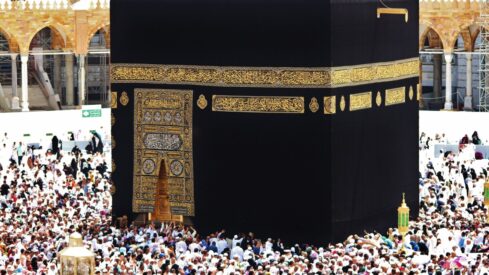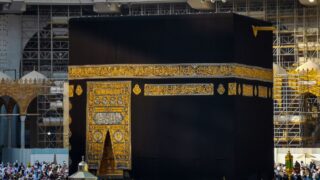Hajj, the fifth and last pillar of Islam, often aptly described as a journey of a lifetime, is, above all, intended to be a life-transforming experience. It is an ardent expression of our love for Allah, a chance to redeem our sins and come clean, an opportunity to reconnect with the sources of our faith, and a chance to experience human brotherhood in action, while imbibing vital lessons of faith such as self-surrender, self-sacrifice, and trust in Allah. The Prophet’s words on the spiritual rewards of hajj are compelling:
Whosoever performs Hajj while having abstained from acts of lewdness, obscenities, and wrangling, shall come home like a newborn (washed clean of sins). (Al-Bukhari and Muslim)
Again, he said, “A virtuous hajj merits no reward other than Paradise” (Al-Bukhari and Muslim). It is therefore imperative for us to recall some important tips in order to enable us to benefit optimally from our performance of this fundamental pillar of our faith:
1. There is nothing more important for a prospective haji (pilgrim) than ensuring the purity of intention while embarking on this journey of a lifetime in order to ensure that it serves as a life-transforming experience. Niyyah means to reexamine one’s motive and purify it of all taints of shirk or ostentation that may render the entire act as utterly devoid of any benefit whatsoever. One must therefore keep one’s intention focused on Allah and pure before undertaking the journey, while at it, and after returning. The Prophet said, “Allah accepts only works that are done solely for Him” (authenticated by Al-Albani).
2. It is equally important to ensure that the fare and provisions for the journey are obtained through lawful means. One must never embark on this journey with anything less than purest of incomes one can afford. The Prophet (peace and blessings be upon him) narrated the deplorable case of a person who undertakes a journey while earning his livelihood through unlawful means; he raises his hands in supplication before the Lord crying out, “Lord!” “But how would Allah answer his prayer, when (his entire body) is nurtured through haram?” (At-Tirmidhi).
3. Since the group or companions we travel with can help either make or break one’s hajj, it is crucial to choose them carefully. Important considerations for choosing a good company should be sound knowledge and piety above everything else. The Prophet (peace and blessings be upon him) taught us that we stand to benefit or lose through the companions we keep, as we tend to imbibe consciously or unconsciously the traits or qualities of our companions.
4. In order to ensure that we start the journey with a clean slate, it is imperative that we take all the necessary steps for sincere repentance of all our sins, outward and inward, major and minor, before embarking on the journey for Hajj. Sincere repentance involves the threefold steps of feeling remorse, refraining from sins, and resolving never to do them again. And, in the case of sins involving violations of the rights of others, it is also essential to seek forgiveness of them and compensate them for hurts or injuries we may have caused them.
5. Since one never can tell whether one will return home safe, prior to the journey, one must write a proper will or testament and get it documented in compliance with the laws of the land. Its purpose is twofold: (1) to ensure that we provide for proper discharging of our trusts, outstanding obligations, or liabilities; (2) to leave such instructions for our heirs that would direct them to right conduct and behavior.
6. “There is no good in performing acts of worship without knowledge,” said `Ali, the eminent Companion and caliph (may Allah be pleased with him). This applies to salah, zakah, and fasting; it is even more applicable to Hajj, as some of the issues relating to it may not be clear even to those who are otherwise knowledgeable. Therefore, one may do well in seeking the guidance of a trained scholar. In addition, in the absence of such guidance, one must take care to take along a comprehensive book on both the rituals and inner meanings of Hajj. For the English speaking, the following are highly recommended: The Inner Dimensions of Islamic Worship by Imam Ghazzali, and The Four Pillars by Sayyid Abul Hasan Ali Nadvi.
7. No less important is to have a good prayer book handy as a ready reference to be consulted always. For the English speaking, I would gladly recommend the inspiring work Remembrance and Prayer: Way of the Prophet by Muhammad Al-Ghazali.
8. It is important to remember that Hajj is incomplete without constancy in celebrating the remembrance of Allah (dhikr). Therefore, one should turn to Allah in supplications both before and during Hajj consistently. Reading of the Qur’an is considered as dhikr par excellence, except of course when and where there are specific prayers prescribed by the Prophet (peace and blessings be upon him).
9. While offering supplications, one must never be slack in saying the prescribed du`aa’s. It is equally important to stress that one must never be inhibited in pouring out one’s heart before one’s Lord in one’s own language as fervently and ardently as possible in a true spirit of reverence, hope, and fear. Shedding tears while doing so is a deeply rewarding and spiritually enriching experience.
10. One need to be armed with an endless reservoir of patience, trusting in the Lord and surrendering to His will. For it is said that journeying is a sort of punishment because it may expose one to unforeseen circumstances and challenges. One must diligently seek to keep one’s cool and never allow one’s emotions or feelings turn offensive or hurtful to others.
11. While in the state of consecration of ihram, one must seek diligently to establish peace with oneself, with Allah, and fellow humans and creatures. Therefore, the duties owed towards others in ordinary times assume greater significance during Hajj. As Imam Ibn Al-Mubarak said, “We owe three duties towards others: Preventing harm from them; rendering active acts of kindness to them; and appearing before them with a pleasant face.” In Hajj, therefore, one must seize every opportunity to help others and protect them through words and deeds.
12. Last but not least is constant meditation on the perennial lessons of Hajj, which can be encapsulated in the following key words: rekindling one’s love for Allah; reconnecting with the sources of one’s faith; imbibing the spirit of utter faith in, surrender to, and trust in Allah as displayed by Prophet Ibrahim and his family; imbibing a deep sense of equality of all people before Allah; constantly meditating on death and one’s journey to Allah; and, finally, visualizing resurrection and one’s standing before the Lord of all beings for final reckoning.
May Allah grant us all a life-transforming experience through Hajj, and may He make us all worthy of His grace and of beholding His beautiful face in the next world. Ameen.
Sheikh Ahmad Kutty is a senior lecturer and Islamic scholar at the Islamic Institute of Toronto, Canada.


















